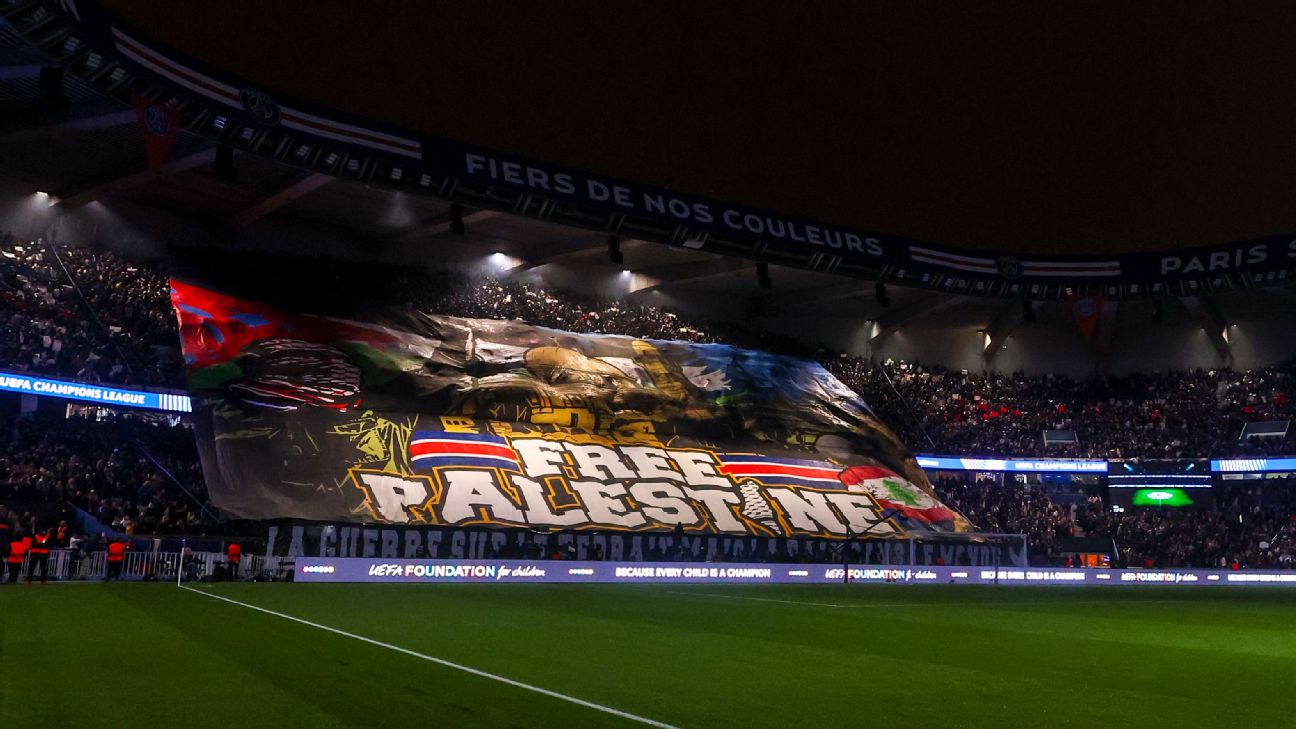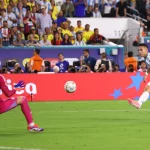Paris Saint-Germain’s Champions League encounter with Atlético Madrid on Wednesday took on a political dimension when fans from PSG’s Auteuil Kop section unfurled a massive “Free Palestine” banner just before kickoff. The banner, displayed prominently at the Parc des Princes stadium, was accompanied by a message urging “war on the pitch, but peace in the world.” As tensions rise ahead of France’s upcoming Nations League match against Israel, the display has sparked strong reactions from the French government and PSG’s leadership, as well as intensified discussions on the blending of sports and political messaging.
The display, which came only days before France is scheduled to play Israel in Paris, has raised questions about the place of political messages in sporting events. In response to the incident, PSG released a statement emphasizing their opposition to political demonstrations at the stadium. French Interior Minister Bruno Retailleau has also voiced disapproval and hinted at possible sanctions, bringing further scrutiny to the unfolding situation.
PSG Fans Show Solidarity with Palestine in Unprecedented Display
PSG’s Auteuil Kop supporters, known for their vocal and visually striking displays, chose the high-stakes match against Atlético Madrid to unveil a “Free Palestine” banner, along with a follow-up message reading, “Does a child’s life in Gaza mean less than another?” The emotional appeal highlighted the perceived inequality in how global conflicts are addressed and intensified calls for solidarity with Palestinian children affected by the ongoing crisis. The banners added a serious tone to the game’s atmosphere, with players and fans alike aware of the tensions both within and beyond the stadium.
In addition to its impact on the footballing community, the display highlighted the role of fans as advocates for social justice. For PSG fans, this is not the first time political messaging has been woven into their support, and the moment at Parc des Princes illustrates how deeply global issues resonate within the sporting arena. However, PSG’s management was quick to distance itself from the message, emphasizing the stadium as a place for soccer, not politics.
PSG’s Response: A Call for Unity and Non-Political Expression
In a swift response, PSG clarified that it had no prior knowledge of the planned display, stating that the stadium is intended to be a space where fans unite around a “common passion for soccer.” In an official statement, PSG expressed firm opposition to messages with political undertones being displayed during matches, citing the need to maintain an atmosphere of unity and inclusivity at Parc des Princes. The club’s stance is consistent with its approach to previous incidents and reflects a desire to keep sports insulated from political discourse.
The tension surrounding PSG’s statement underscores the difficult balancing act clubs face when navigating fans’ rights to express their views within stadiums. PSG’s leadership is tasked with addressing the concerns of both fans who wish to use the platform of sports for advocacy and those who believe sports should remain apolitical. In the wake of this incident, PSG is likely to re-examine policies regarding fan displays, particularly with significant matches coming up in Paris.
Interior Minister Calls Banner “Unacceptable” and Considers Sanctions
French Interior Minister Bruno Retailleau condemned the display as “unacceptable” and indicated that potential repercussions for PSG might be on the horizon. Speaking to Sud Radio, Retailleau said he would seek explanations from PSG about the incident and suggested that penalties against the club might be warranted. The strong response from the French government points to the sensitivity of the situation, especially given the political tensions surrounding the upcoming France-Israel match.
Retailleau’s comments highlight the role of government oversight in maintaining security and order at public sporting events. In France, where political demonstrations and soccer games are often intertwined, officials are wary of how such displays might affect public sentiment and security, particularly with a diverse fanbase that includes both Jewish and Muslim communities. Retailleau’s intervention suggests that authorities may take stricter measures to limit politically charged displays in future events.
PSG Fans’ Gesture Echoes Past Incidents Across Europe
The incident at Parc des Princes recalls similar displays in recent years where fans have shown solidarity with Palestine during high-profile soccer matches. Last season, for example, Celtic fans were fined by UEFA after waving Palestinian flags during a Champions League game. UEFA imposed a €17,500 ($18,839) fine, underscoring the organization’s stance against mixing political messages with soccer. The incident also reflects a broader trend across European stadiums where fan groups have used matches as platforms to express solidarity on global issues, especially on matters related to Palestine.
European soccer, governed by strict regulations on political neutrality, has grappled with such displays for years. As organizations like UEFA and FIFA work to ensure games remain focused on the sport itself, they are constantly challenged by fans’ desires to voice their concerns. PSG’s incident is a reminder of how, despite attempts to create boundaries, the personal convictions of fans inevitably find their way into the game.
Security Concerns Intensify Ahead of France’s Match Against Israel
The timing of the display comes just days before France is set to face Israel in a Nations League match at the Stade de France, raising concerns over security at the 80,000-capacity venue. Given the geopolitical context and the large communities of both Jewish and Muslim residents in France, authorities are preparing for a potentially high-tension environment. Last month, Paris police confirmed the match would proceed with fans in attendance, but emphasized the need for strict security protocols to ensure safety.
This security challenge echoes recent matches in Europe where tensions led to heightened precautions. For instance, when Italy hosted Israel in Udine, organizers enforced tight security measures. In Belgium, authorities took a different approach by relocating a match against Israel to Debrecen, Hungary, due to safety concerns. For the upcoming France-Israel match, officials are acutely aware of the potential for politically motivated displays and are likely to increase security measures both inside and outside the stadium.
A Fine Line Between Passion and Politics in European Football
The PSG fans’ display and the resulting fallout exemplify the fine line European clubs and fans navigate when it comes to mixing passion for soccer with political views. Many supporters argue that soccer stadiums offer a unique platform to amplify global issues and highlight injustices, especially for causes that resonate deeply within their communities. However, clubs and governing bodies like UEFA remain committed to preserving a neutral space within stadiums, discouraging displays that might disrupt the unity of fans or incite division.
For PSG, the challenge lies in balancing the enthusiasm and conviction of their fans with the need to maintain an environment that aligns with UEFA’s policies. As similar situations continue to arise across Europe, clubs may face increasing pressure to regulate expressions of solidarity while maintaining respectful dialogue with their fans.
Please check for information on the best betting sites in India – https://selectory.org/best-betting-sites/















